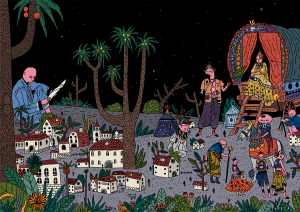“Wherever they might be they always remember that the past was a lie, that memory has no return, that every spring gone by could never be recovered, and that the wildest and most tenacious love was an ephemeral truth in the end.”
Gabriel Garcia Marquez’s One Hundred Years of Solitude has etched its way into the literary premise of classics, delved deeper into the conversation of isolation, and has created an alternate reality that I don’t quite understand. Moreover, the writing style and literary devices implemented within the novel are not resistant to digestion. Marquez’s ability to conceive comprehension that is acknowledged and understood does not aid in the exclusion of its easily perceivable language. The words themselves do not make it a difficult read, but rather what these words are trying to convey. Both the dialogue and settings are conducted in a way that is very much modernistic, thus it is not necessary to shift the perceptive of the reader to submerge oneself into a historical mindset. Additionally, the primary complications arise from the naming of the characters and how a multitude of them all carry the same denominations. There are a lot of ‘Arcadios’ and ‘Aurelianos’ with no clear indication (if not paying attention) of when one storyline ends and another begins. They seemingly overlap and contradict and throw the reader into a whirlwind of ancestral loops intertwined and knotted together. It’s easy to forget who is who at moments in time.
reality that I don’t quite understand. Moreover, the writing style and literary devices implemented within the novel are not resistant to digestion. Marquez’s ability to conceive comprehension that is acknowledged and understood does not aid in the exclusion of its easily perceivable language. The words themselves do not make it a difficult read, but rather what these words are trying to convey. Both the dialogue and settings are conducted in a way that is very much modernistic, thus it is not necessary to shift the perceptive of the reader to submerge oneself into a historical mindset. Additionally, the primary complications arise from the naming of the characters and how a multitude of them all carry the same denominations. There are a lot of ‘Arcadios’ and ‘Aurelianos’ with no clear indication (if not paying attention) of when one storyline ends and another begins. They seemingly overlap and contradict and throw the reader into a whirlwind of ancestral loops intertwined and knotted together. It’s easy to forget who is who at moments in time.
“…time was not passing… it was turning in a circle…”
Yet, like any good author, there is a reason for everything– an underlying motivation hidden within the folds of expert and precise writing. As George Santayana once said, people who forget history are doomed to repeat it. There is a method to the madness of this tightly wound narrative, and a lesson to be learned from this purposefully placed confusion. Each Arcadio and Aureliano running around has their own individual cause for existence, placed attentively inside his expansive world of seclusion. Despite all of this, Marquez is acutely aware of the readers, and allows for the simplification of his characters throu gh the usage of nicknames (with most tending to stick with them throughout the entirety of the novel) and clear indications about who is who, regardless of how often I lost focus and had to return to previous passages to make sure I knew which Arcadio or Aureliano had died or done something stupid. However, the availability of a family tree at the beginning of the book does act as a solid reference for when things do get unreasonably complicated.
gh the usage of nicknames (with most tending to stick with them throughout the entirety of the novel) and clear indications about who is who, regardless of how often I lost focus and had to return to previous passages to make sure I knew which Arcadio or Aureliano had died or done something stupid. However, the availability of a family tree at the beginning of the book does act as a solid reference for when things do get unreasonably complicated.
Therefore, the repetition serves as an important theme. One exceedingly predominant message of this narrative is expressed through the way in which both personal and political history not only coincide, but are persistently reoccurring and replicating themselves, repeating over and over again. And if not precisely repeating, then they are somewhat –in a sense– rhyming, forcing parallels between generations of similar conceptualizations. For instance, Marquez illustrates this ideal by continuously reusing particular names throughout the lineage for a great number of characters.
Somewhere within the story, Ursula brings attention to the concept that based on the names given to the men, their characteristics correspond. She indicates that those who are named Aurelianos are “brainy,” while Arcadios are “brawny,” despite this not always being the case, or even all that true. In addition, what’s even more compelling is that these names seem to carry a degree of prophesied destiny; an inescapable fate; a neverending cycle. The unfortunate predictability that these names seem to carry contributes to the idea that they are unable to be released from the grasp of inevitability clinging to their familial misfortunes.
of prophesied destiny; an inescapable fate; a neverending cycle. The unfortunate predictability that these names seem to carry contributes to the idea that they are unable to be released from the grasp of inevitability clinging to their familial misfortunes.
Marquez highlights moments in time where characters attempt to break this tradition of recycling names, yet are prohibited from going through with this in some way or another. At one point, Ameranta Ursula tries to name her son Rodrigo. Nonetheless, her wishes are dismissed and Aureliano #2 passes down his name to Aureliano #3. Fernanda’s daughter, Renata, is only referred to as Meme, which is a derivative of Remedios. And she then decides not to name her own child at all, simply referring to them as Aureliano out of respect and recognition of her family. Alas, fate does not dismiss them, and they all succumb to the same outcome as their predecessors, predestined to follow in the footsteps of their ancestors, solitarily repeating history time and time again.
This book constantly brings the phrase “Those who do not know history are doomed to repeat it” and your analysis hits the nail on the head as to why. The family never learns from their mistakes and continues to repeat them.
Rae,
I appreciate your point that “the words themselves do not make it a difficult read, but rather what these words are trying to convey.” Gabriel Garcia Marquez has exquisitely enchanting language, and his use of magic surrealism creates vibrant, beautiful imagery even in grotesque or heartbreaking scenarios. What does it say about humanity when (thinking of his other novel Chronicle of a Death Foretold) the hanging of entrails can be described and pictured as a bouquet of roses? Similarly, throughout this novel how do the descriptions of an ultimately decimated society and family aid our understanding of the complexity of the family, and the complexity of ourselves?